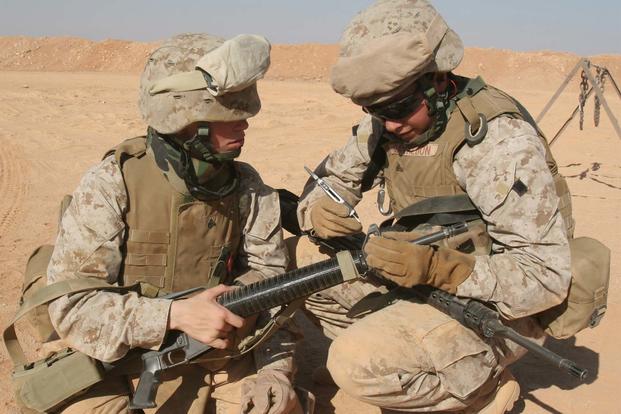As the first female enlisted infantry Marines take their places in operational units, another female officer is preparing to attempt what hay trs so far been the most challenging hurdle for women entering the infantry: the Corps' famously grueling Infantry Officer Course.
One female second lieutenant is set to start the course in approximately 90 days, a spokesman for Marine Corps Training and Education Command, Capt. Joshua Pena, told Military.com.
The officer, who attempts the course after having completed the service's basic officer training courses, will be the second woman to try to do so since the Marine Corps opened all combat jobs to women, Pena said.
During an evaluation period that extended from September 2012 to June 2015, 27 female officers attempted the course to assist the Corps with its research on women serving in ground combat roles, but none was able to pass. During the same timeframe, two other female officers attempted to pass the course in an effort to qualify for the ground intelligence military occupational specialty, but they were also unsuccessful.
In that three-year stretch, 978 male officers attempted IOC and 692 graduated, Pena said.
The 30th and most recent female officer to attempt the course tried twice to complete the course, in April and August 2016. On both tries, she was dropped for failing to complete two conditioning hikes. On both attempts, however, she was able to pass the initial Combat Endurance Test, an obstacle that has stymied most female officers who participated in IOC.
Speaking to reporters Jan. 11, Navy Secretary Ray Mabus said the reason women have successfully passed the Army's Ranger School but have to date been unable to get through IOC is that the two courses have different physical demands.
"One of the things about IOC is that it involves carrying a huge amount of stuff," he said. "And if you are in the infantry in the United States Marines, you're going to break down."
Chairman of the Joint Chiefs of Staff Gen. Joseph Dunford and Marine Commandant Gen. Robert Neller are examples of that, Mabus said. Both infantry officers, they have had medical interventions to replace or reinforce joints worn down from years of high-impact operations.
Mabus reiterated that he isn't concerned with how many women make it through IOC, or how long it takes to get the first female graduate.
"The important thing is that it's open for anybody who qualifies," he said. "It's just that you have a chance to make it through."
He added that he believes the standards are realistic, despite how challenging the course appears.
"Now the standards they've set have to be job-related. They have to be aligned with what a person has to do in the field. So I'm pretty confident that they are," he said.
To date, female enlisted Marines have had much greater success at making it to the fleet as infantrymen. The first three female Marines joined an infantry unit -- 2nd Battalion, 8th Marines -- this month. And the first group of female Marine recruits with infantry contracts is set to graduate boot camp before February.
-- Hope Hodge Seck can be reached at hope.seck@military.com. Follow her on Twitter at@HopeSeck.
Related Video:
Two Minute Brief: Women in the U.S. Military






























